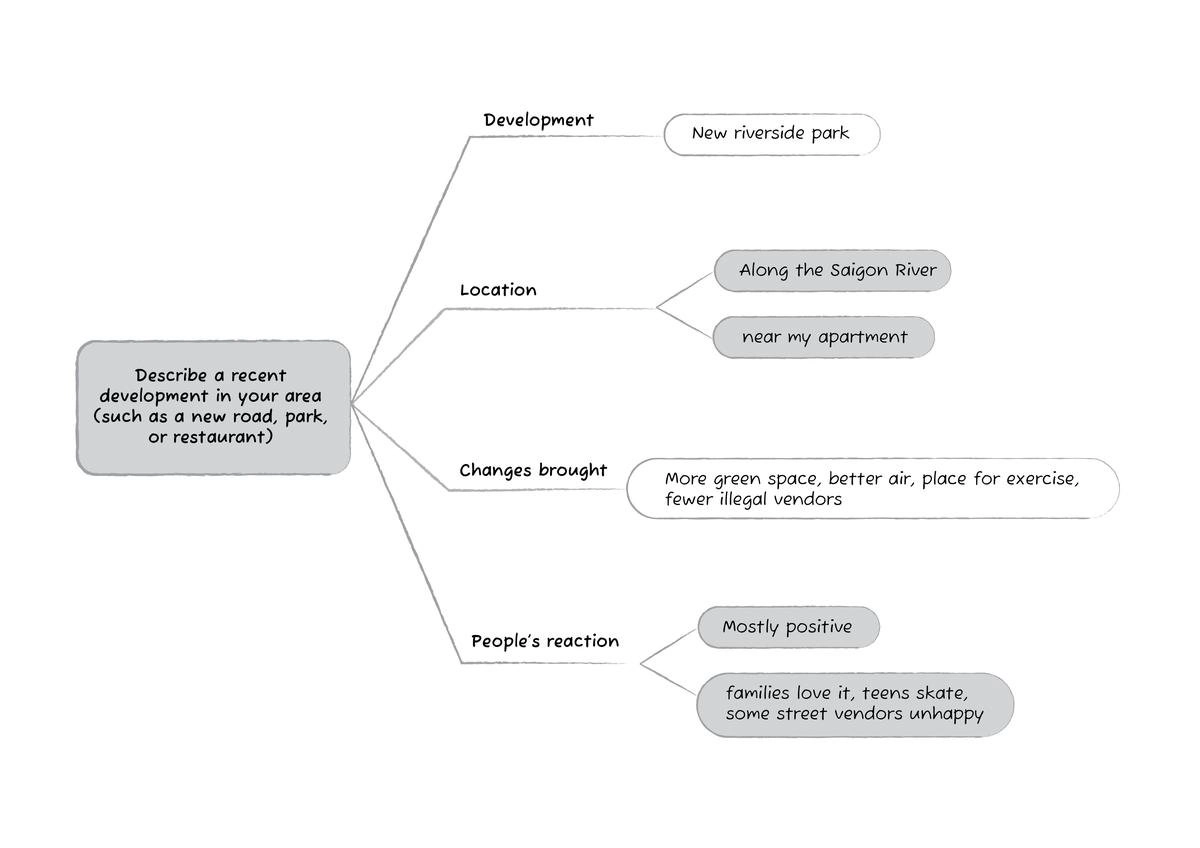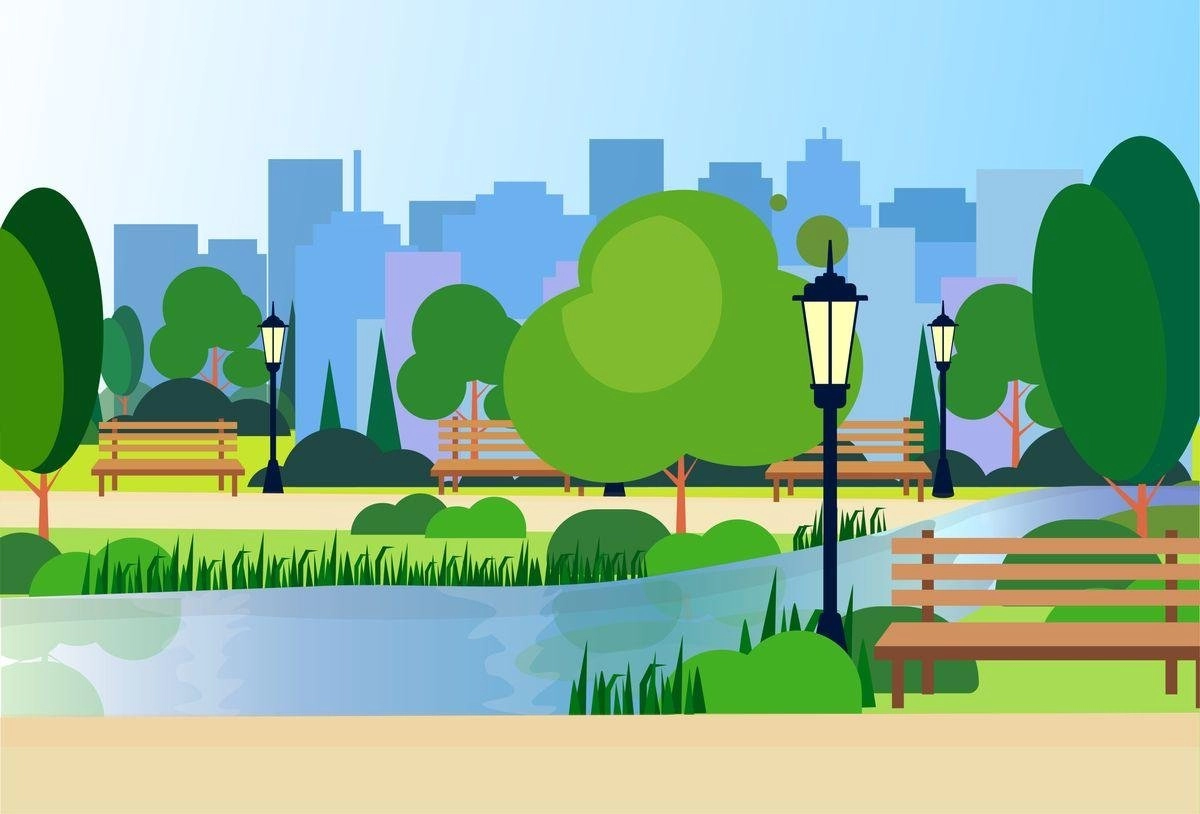Describe a recent development in your area (such as a new road, park, or restaurant)
Key takeaways
Part 2: A recent development
New riverside park near my apartment
Along the Saigon River
Cleaner area, more green space, outdoor gym, safer for families
People mostly positive; only some vendors unhappy
Part 3: Public Transport & Facilities
Common: buses, motorbike taxis
Issues: slow, crowded, unreliable
Good systems cut congestion, save time
Can replace private vehicles if convenient
Suitable facilities: parks, libraries, community centers
Trong IELTS Speaking Part 2, nhóm chủ đề Describe a Place (miêu tả địa điểm) là một dạng bài quen thuộc. Đề bài “Describe a recent development in your area” là một biến thể cụ thể, không chỉ yêu cầu thí sinh miêu tả một công trình mới mà còn phải phân tích được sự thay đổi và tác động của nó đến cộng đồng.
Để giúp người học hệ thống hóa ý tưởng và tối ưu hóa điểm số, bài viết này sẽ hướng dẫn thí sinh cách phân tích đề bài một cách chi tiết, lên ý tưởng và ghi chú nhanh để chuẩn bị trong 1 phút, sau đó là bài nói mẫu hoàn chỉnh với các fillers, signposts và idioms tự nhiên. Ngoài ra, phần phân tích từ vựng hữu ích theo chủ đề và các câu hỏi Discussion Questions ở Part 3 sẽ giúp người học mở rộng vốn từ và chuẩn bị toàn diện cho cả ba phần thi Speaking.
Bài mẫu chủ đề “Describe a recent development in your area (such as a new road, park, or restaurant)”
You should say:
What the development is
Where it is located
How it has changed the area
And explain how people in your area feel about it.
1. Analyze – Phân tích đề bài
Đề bài: Describe a recent development in your area (such as a new road, park, or restaurant).

Từ khóa quan trọng:
Từ vựng trong đề | Nghĩa tiếng Việt |
|---|---|
Recent development | Sự phát triển gần đây |
Located | Nằm ở đâu |
Changed the area | Làm thay đổi khu vực |
Feel about it | Cảm nhận của mọi người |
2. Craft – Lên ý tưởng & Từ vựng chủ đề

3. Execute – Bài nói mẫu (có fillers, signposts, idioms)
Alright, so I’d love to share with you a recent development in my neighborhood that I think has made a big difference — it’s a brand-new riverside park that opened just a couple of months ago.
So basically, the park is located along the Saigon River, just a short walk from where I live. It used to be a really neglected area with illegal food stalls and lots of trash lying around. But now? It’s completely transformed into a beautiful green space with walking paths, benches, a playground, and even a little outdoor gym.
Honestly, the change has been incredible. It’s not just about the appearance — the park has improved the quality of life in the area. For example, families now have a safe place to take their kids, elderly people can go for a morning stroll, and teenagers often gather to skate or hang out. It’s also helped reduce traffic around nearby streets since more people choose to walk or bike now.
As for how people feel about it, I’d say the reaction has been overwhelmingly positive. Most locals love it because it brings fresh air and a sense of community. Of course, a few street vendors lost their spots, so they weren’t too happy at first. But overall, the park has really added value to our area and made it much more livable.
All in all, I think this development is a great example of urban planning done right — and to be honest, I hope the city continues with more projects like this in the future.

Bài mẫu cùng chủ đề:
Describe a new development in the area where you live (e.g shopping mall, park,...)
Describe a public facility that has been renovated and improved in your area
4. Analyze Useful Vocab – Theo chủ đề (trích từ bài nói)
1. Mô tả địa điểm và công trình
Từ/Cụm từ | Nghĩa | Ví dụ ngữ cảnh mới |
|---|---|---|
Riverside park | Công viên ven sông | “They built a lovely riverside park near my university.” |
Neglected area | Khu vực bị bỏ hoang, thiếu chăm sóc | “That empty lot used to be a neglected area full of weeds.” |
Outdoor gym | Khu tập thể thao ngoài trời | “Many parks now include outdoor gyms for locals to use.” |
2. Thay đổi tích cực
Từ/Cụm từ | Nghĩa | Ví dụ ngữ cảnh mới |
|---|---|---|
Green space | Không gian xanh | “Having more green spaces can improve mental health.” |
Improve quality of life | Cải thiện chất lượng cuộc sống | “Affordable housing helps improve the quality of life for low-income families.” |
Sense of community | Cảm giác gắn kết cộng đồng | “Community centers help create a strong sense of community.” |
3. Phản ứng & cảm xúc
Từ/Cụm từ | Nghĩa | Ví dụ ngữ cảnh mới |
|---|---|---|
Overwhelmingly positive | Phản hồi rất tích cực | “The feedback from users has been overwhelmingly positive.” |
Lost their spots | Mất chỗ làm việc (ý nói các hàng rong) | “Some local vendors lost their spots after the renovation.” |
Urban planning | Quy hoạch đô thị | “Good urban planning can reduce congestion and pollution.” |
Part 3: Discussion Questions – Public Transport & Facilities
1. What types of public transport are most commonly used in Vietnam?
📌 Point: In Vietnam, the most commonly used public transport options are buses and motorbike taxis.
📌 Explain: These methods are affordable and can navigate Vietnam’s busy and crowded streets quite easily.
📌 Example: For example, in major cities like Hanoi and Ho Chi Minh City, buses are widely used by students and workers for their daily commute.
📌 Link: So overall, public transport here is mainly based on simple and accessible options.
Vocabulary Highlights:
navigate
Phát âm: /ˈnæv.ɪ.geɪt/
Dịch: Di chuyển, điều hướng
Ví dụ: Small vehicles can navigate narrow streets more easily.
daily commute
Phát âm: /ˈdeɪ.li kəˈmjuːt/
Dịch: Quãng đường đi lại hằng ngày
Ví dụ: Many people rely on buses for their daily commute.
2. What are some disadvantages of public transportation in your country?
📌 Point: Public transportation in Vietnam still has several drawbacks.
📌 Explain: Services can be slow, overcrowded, and sometimes unreliable due to traffic jams or inconsistent schedules.
📌 Example: For instance, buses in big cities often arrive late during rush hour, making it challenging for passengers to be on time.
📌 Link: So these issues make public transport less convenient for many people.
Vocabulary Highlights:
overcrowded
Phát âm: /ˌoʊ.vɚˈkraʊ.dɪd/
Dịch: Quá đông
Ví dụ: Buses are often overcrowded during peak hours.
unreliable
Phát âm: /ˌʌn.rɪˈlaɪ.ə.bəl/
Dịch: Không đáng tin cậy
Ví dụ: Unreliable schedules make passengers frustrated.
3. What are the benefits of having an efficient public transport system?
📌 Point: An efficient public transport system brings many benefits.
📌 Explain: It reduces traffic congestion, lowers pollution, and helps people save both money and time.
📌 Example: For example, cities with well-developed metro systems often experience smoother traffic flow and cleaner air.
📌 Link: So improving public transport can significantly enhance the quality of urban life.
Vocabulary Highlights:
traffic congestion
Phát âm: /ˈtræf.ɪk kənˈdʒes.tʃən/
Dịch: Tắc nghẽn giao thông
Ví dụ: Public transport helps reduce traffic congestion.
enhance
Phát âm: /ɪnˈhæns/
Dịch: Nâng cao, cải thiện
Ví dụ: Better infrastructure enhances living standards.
4. Do you think public transport can be an effective alternative to private vehicles? Why or why not?
📌 Point: Yes, public transport can be an effective alternative, but only if it's well developed.
📌 Explain: When services are convenient, frequent, and comfortable, people are more willing to switch from private cars or motorbikes.
📌 Example: For example, in places like Singapore, efficient public transport encourages many residents to avoid owning cars.
📌 Link: So with enough investment, public transport can replace private vehicles to a large extent.
Vocabulary Highlights:
frequent
Phát âm: /ˈfriː.kwənt/
Dịch: Thường xuyên
Ví dụ: Frequent services make public transport more attractive.
alternative
Phát âm: /ɑːlˈtɝː.nə.tɪv/
Dịch: Sự thay thế
Ví dụ: The bus system can be a good alternative to driving.
5. What kinds of public facilities are suitable for people of all ages?
📌 Point: There are many public facilities suitable for people of all ages.
📌 Explain: Parks, libraries, and community centers provide safe and inclusive spaces for relaxation, learning, and social interaction.
📌 Example: For instance, public parks offer walking paths for adults, playgrounds for children, and fitness areas for the elderly.
📌 Link: So these facilities help build healthier and more connected communities.
Vocabulary Highlights:
inclusive
Phát âm: /ɪnˈkluː.sɪv/
Dịch: Mang tính bao hàm, phù hợp cho mọi người
Ví dụ: Inclusive spaces allow everyone to participate.
community center
Phát âm: /kəˈmjuː.nə.ti ˈsen.t̬ɚ/
Dịch: Trung tâm cộng đồng
Ví dụ: Community centers host activities for all age groups.
Đọc thêm: IELTS Speaking Topic Transportation
Tổng kết
Trên đây là hướng dẫn chi tiết để trả lời đề bài “Describe a recent development in your area (such as a new road, park, or restaurant)” trong IELTS Speaking Part 2, bao gồm phân tích đề bài, lên ý tưởng, bài nói mẫu và phân tích từ vựng theo chủ đề.
Thí sinh nên chú ý rằng việc sử dụng fillers, signposts và idioms một cách tự nhiên sẽ giúp bài nói trở nên sinh động và thuyết phục hơn. Tuy nhiên, người học không nên lạm dụng các yếu tố này mà cần đảm bảo nội dung vẫn mạch lạc và rõ ràng. Phần Part 3 về Inventions and Inventors sẽ giúp thí sinh mở rộng khả năng thảo luận sâu hơn về các chủ đề liên quan đến phát triển và đổi mới, từ đó đạt được band điểm Speaking mong muốn.
Thí sinh có thể tham gia khóa học luyện đề IELTS nâng cao tại ZIM để chinh phục mục tiêu 7.0 - 7.5 thông qua hệ thống đề thi bám sát thực tế, phương pháp phân tích chi tiết và chiến lược trả lời hiệu quả.

Bình luận - Hỏi đáp